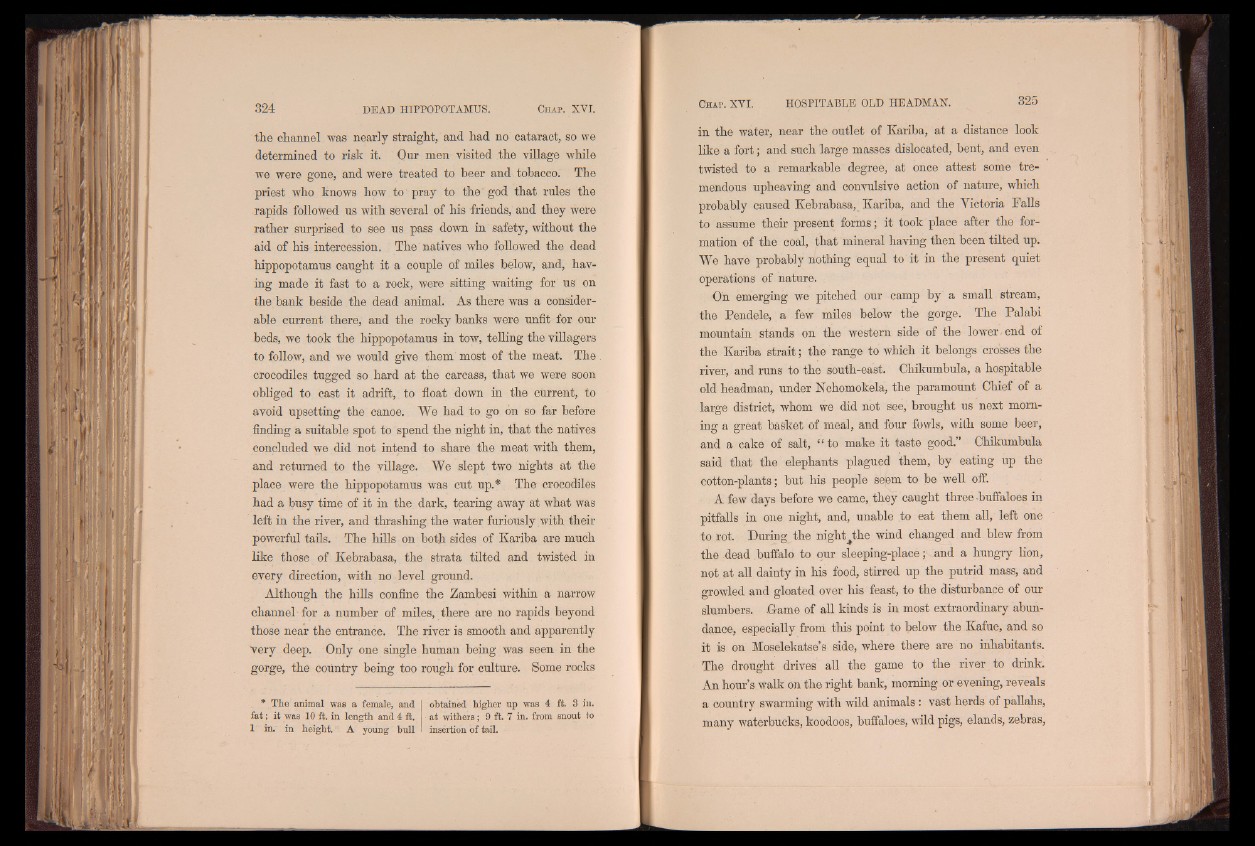
the channel was nearly straight, and had no cataract, so we
determined to risk it. Our men visited the village while
we were gone, and were treated to beer and tobacco. The
priest who knows how to pray to the god that rules the
rapids followed us with several of his friends, and they were
rather surprised to see us pass down in safety, without the
aid of his intercession. The natives who followed the dead
hippopotamus caught it a couple of miles below, and, having
made it fast to a rock, were sitting waiting for us on
the bank beside the dead animal. As there was a considerable
current there, and the rocky banks were unfit for our
beds, we took the hippopotamus in tow, telling the villagers
to follow, and we would give them most of the meat. The
crocodiles tugged so hard at the carcass, that we were soon
obliged to cast it adrift, to float down in the current, to
avoid upsetting the canoe. We had to go on so far before
finding a suitable spot to spend the night in, that the natives
concluded we did not intend to share the meat with them,
and returned to the village. We slept two nights at the
place were the hippopotamus was cut up.* The crocodiles
had a busy time of it in the dark, tearing away at what was
left in the river, and thrashing the water furiously with their
powerful tails. The hills on both sides of Kariba are much
like those of Kebrabasa, the strata tilted and twisted in
every direction, with no level ground.
Although the hills confine the Zambesi within a narrow
channel for a number of miles, there are no rapids beyond
those near the entrance. The river is smooth and apparently
Very deep. Only one single human being was seen in the
gorge, the country being too rough for culture. Some rocks
* The animal was a female, and obtained higher up was 4 ft. 3 in.
f a t; it was 10 ft. in length and 4 ft. at withers ; 9 ft. 7 in. from snout to
1 in. in height. A young bull insertion of tail.
in the water, near the outlet of Kariba, at a distance look
like a fort; and such large masses dislocated, bent, and even
twisted to a remarkable degree, at once attest some tremendous
upheaving and convulsive action of nature, which
probably caused Kebrabasa, Kariba, and the Yictoria Kails
to assume their present forms; it took place after the formation
of the coal, that mineral having then been tilted up.
We have probably nothing equal to it in the present quiet
operations of nature.
On emerging we pitched our camp by a small stream,
the Pendele, a few miles below the gorge. The Palabi
mountain stands on the western side of the lower,end of
the Kariba strait; the range to which it belongs crosses the
river, and runs to the south-east. Chikumbula, a hospitable
old headman, under Nchomokela, the paramount Chief of a
large district, whom we did not see, brought us next morning
a great basket of meal, and four fowls, with some beer,
and a cake of salt, I to make it taste good.” Chikumbula
said that the elephants plagued them, by eating up the
cotton-plants; but his people seem to be well off.
A few days before we came, they caught three buffaloes in
pitfalls in one night, and, unable to eat them all, left one
to rot. During the night the wind changed and blew from
the dead buffalo to our sleeping-place | and a hungry lion,
not at all dainty in his food, stirred up the putrid mass, and
growled and gloated over his feast, to the disturbance of our
slumbers. .Game of all kinds is in most extraordinary abundance,
especially from this point to below the Kafue, and so
it is on Moselekatse’s side, where there are no inhabitants.
The drought drives all the game to the river to drink.
An hour’s walk on the right bank, morning or evening, reveals
a country swarming with wild animals: vast herds of pallahs,
many waterbucks, koodoos, buffaloes, wild pigs, elands, zebras,